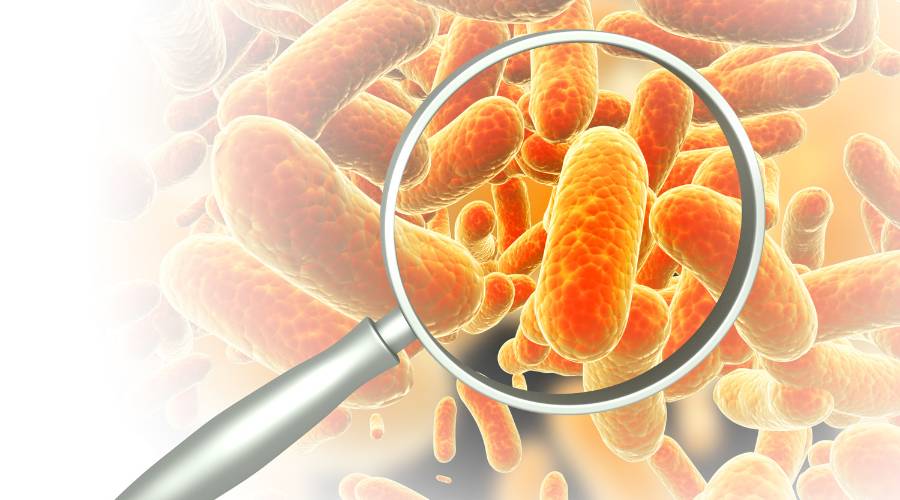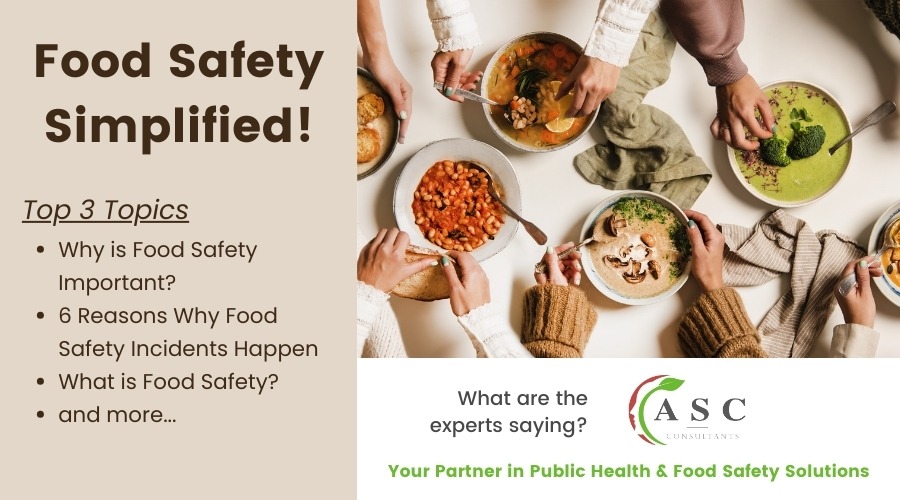Food Safety is critical to human health and well-being and inadequate Food Safety practices in a food handling enterprise can compromise the consumer’s health. Food Safety refers to all the measures and practices taken to ensure that food is safe to eat and free from harmful contaminants.
Do you want to start a food business or consider working in the food and beverage industry? We have simplified what Food Safety is and why is it important.
You are invited to our Free Webinar: JOIN HEREWhy is Food Safety Important?
Food safety is an important aspect of any food business. After all, no consumer would willingly buy food that is likely to make them sick. Consumers have become more educated about food safety and the associated risks.
There are several reasons why Food Safety is important for your food-handling establishment. Here is a list of reasons (to only mention a few):
- Preventing illness: Foodborne illnesses can cause serious health problems, including diarrhoea, vomiting, fever, and even death. By ensuring that food is free from harmful contaminants, we can prevent these illnesses from occurring.
- Protecting vulnerable populations: Certain populations, such as young children, the elderly, pregnant women and people with weakened immune systems, are at a higher risk of developing serious illnesses from foodborne contaminants. Food safety measures help to protect these vulnerable populations.
- Preventing economic losses: Foodborne illnesses can also have a significant economic impact. When people become sick from contaminated food, they may miss work or require medical care, resulting in lost productivity and increased healthcare costs.
- Maintaining consumer confidence: Ensuring food safety is essential to maintaining consumer confidence in the food supply. When people trust that the food they are eating is safe, they are more likely to stay loyal to your brand.
- Preventing revenue loss and loss of credibility: If a company does experience a food safety incident, it is highly likely that the incident would translate to revenue loss. Not to even mention the damage done to your brand. It may take years for the company to earn back consumer confidence and recover its market position.
- Avoid legal action and penalties: Food safety is a legal requirement and penalties or facing jail time is a possibility for companies not complying with legislation. In addition, a consumer also has the to take legal action if they were the victim of a food safety incident.
6 Reasons Why Food Safety Incidents Happen
Overall, Food Safety incidents can occur due to a combination of factors, including human error, equipment or facility failures, inadequate oversight or regulation, and environmental factors.
It is important to maintain high standards of Food Safety at all stages of the food supply chain to minimize the risk of incidents and protect public health. Unfortunately, far too many companies only focus on increased production and profit margins and ignore the necessity of keeping consumers’ health at the centre of their business.
There are many reasons why Food Safety incidents can happen. Here are some possible factors:
- Contamination: Food can become contaminated with harmful pathogens, such as bacteria, viruses, and parasites, during production, processing, transportation, storage, or handling. This can happen due to poor hygiene practices, equipment or facility design flaws, inadequate sanitation, or other factors.
- Cross-contamination: When food comes into contact with other contaminated food or surfaces, it can lead to cross-contamination. This can happen during the preparation, cooking, or serving of food.
- Mishandling: Food Safety incidents can occur when food is mishandled, such as when it is stored at the wrong temperature, not cooked properly, or left out for too long.
- Mislabelling: Food Safety incidents can also occur when food is mislabelled or misbranded, such as when it contains undeclared allergens, incorrect ingredients, or incorrect nutritional information.
- Fraud: In some cases, Food Safety incidents can occur due to intentional fraudulent practices, such as the use of adulterated or counterfeit ingredients, misrepresenting the origin of the food, or mislabelling the food.
- Environmental factors: Natural disasters, such as floods or hurricanes, can also lead to Food Safety incidents by contaminating crops, interrupting supply chains, or disrupting food processing and distribution.
Far too many food handling companies are usually ill-prepared to deal with Food Safety incidents and this is often due to Senior Management showing their ignorance and/or lack of Food Safety knowledge.
7 Steps How Senior Management Can Help Prevent Food Safety Incidents

Senior Management can take several steps to prevent or reduce the risk of Food Safety incidents. Here are some suggestions:
- Establish a Food Safety Culture: Senior management should establish a Food Safety culture in the organisation. This includes creating a culture where Food Safety is a top priority, and everyone understands the importance of following Food Safety procedures and protocols.
- Develop and implement a Food Safety management system: Senior management should develop and implement a Food Safety management system that is based on recognised Food Safety standards such as HACCP. The system should include regular training for employees on Food Safety, monitoring and testing of Food Safety procedures, and continuous improvement processes.
- Provide adequate resources: Senior management should provide adequate resources to ensure that Food Safety procedures are followed, including funding for equipment, training, and personnel.
- Set clear Food Safety policies and procedures: Senior management should set clear policies and procedures for Food Safety, including guidelines for handling food, monitoring Food Safety, and reporting incidents.
- Conduct regular audits: Senior management should conduct regular audits of Food Safety procedures to ensure that they are being followed correctly.
- Stay up to date on Food Safety regulations: Senior management should stay up to date on Food Safety regulations and laws to ensure that their organization is in compliance.
- Encourage open communication: Senior management should encourage open communication about Food Safety issues and incidents and ensure that employees feel comfortable reporting any concerns or incidents.
By implementing these steps, senior management can help prevent Food Safety incidents and ensure that their organization is operating safely and efficiently.
What is Food Safety?
Food Safety refers to the measures taken to ensure that food is free from harmful contaminants and is safe for human consumption. It involves the identification, assessment, and management of potential Food Safety hazards at every stage of the food supply chain, from production and processing to distribution and consumption.
The goal of Food Safety is to prevent foodborne illnesses and protect public health by ensuring that food is safe, nutritious, and of high quality.
In the food industry when reference is made to “Food Safety” it mainly refers to all measures taken to identify and prevent or reduce the risk of Food Safety hazards from contaminating the food product.
What are Food Safety Hazards?

Food Safety hazards refer to biological, chemical (including allergens), or physical substances that may cause harm to human health if present in food.
These hazards can occur at any stage of food production, processing, storage, or handling. It is important to identify and control these hazards to prevent foodborne illnesses and ensure food safety.
Here is a summary of the main types of Food Safety hazards with examples:
Biological Food Safety Hazards:
Biological hazards include microorganisms such as bacteria, viruses, fungi, and parasites that can cause foodborne illnesses such as Salmonella, E. coli, Listeria, and Campylobacter.
Chemical Food Safety Hazards:
Chemical hazards include natural toxins produced by plants, animals, or microorganisms, as well as chemical contaminants such as heavy metals, pesticides, cleaning agents and food additives.
FOOD ALLERGENS:
Food allergens refer to the potential risks posed by foods that contain ingredients that can cause an allergic reaction in some individuals. These allergens may include common ingredients such as milk, eggs, peanuts, tree nuts, fish, shellfish, wheat, and soy.
PHYSICAL FOOD SAFETY HAZARDS:
Physical Food Safety hazards include foreign objects such as glass, metal, plastic, stones, and bones that may accidentally contaminate food and pose a choking or injury risk.
The Importance of a Food Safety Management System (FSMS)
Food Safety Management Systems are essential for protecting public health, complying with regulations, reducing costs, improving food quality, and enabling international trade.
These systems involve the implementation of policies, procedures, and practices to prevent, control, and eliminate food safety hazards at all stages of the food supply chain, from production to consumption.
The importance of food safety management systems can be seen in several ways:
- Protection of public health: The primary objective of food safety management systems is to protect public health by ensuring that food is safe and free from contaminants and harmful microorganisms that can cause foodborne illness.
- Compliance with regulations: Food safety management systems help businesses comply with regulations and standards set by governments and international organisations. Compliance with these regulations is necessary for businesses to avoid legal action and maintain their reputation.
- Reduction of costs: Implementing food safety management systems can help reduce costs associated with foodborne illness outbreaks, product recalls, and legal action. These systems also help businesses avoid the financial losses and damage to reputation that can result from these incidents.
- Improvement of food quality: Food safety management systems can also help improve the overall quality of food by ensuring that it is produced, handled, and stored under appropriate conditions.
- International trade: International trade in food products requires compliance with a range of regulations and standards. Implementing food safety management systems can help businesses meet these requirements, enabling them to participate in international trade.
The absence of FSMS or ineffective FSM Systems is the leading cause of food safety incidents. We do not live in a perfect world, and food safety incidents happen every day. Having an effective FSM system in place can reduce and even eliminate food safety incidents in your company.
Conclusion
Overall, food safety is crucial for protecting human health and well-being, preventing economic losses, and maintaining consumer confidence.
It is important for everyone involved in the food industry, including farmers, processors, distributors, and retailers, to prioritise food safety in their operations. The consequences of not implementing an effective Food Safety Management system can lead to Food Safety incidents and prove detrimental to the consumer’s health and the business itself.
Do you think Food Safety practices and implementing a Food Safety Management System are worth the effort?
Please drop us a comment in the comment section below. We love to hear from our website visitors.
Related Articles
Check out our other related articles for more tips!








Wow, I love your website. It is fresh, attractive and informative. You seem to know where you are going, and what you want to accomplish. Keep up the good work.
Food safety is certainly of great concern to everyone of us. As we make many of our purchases in supermarkets, or eat out in restaurants, we are in a way putting our health and our lives in the hands of others. We are confiding in the fact that our food items are being handled properly and safely. Unfortunately, many of us know that we are playing “Russian roulette” every time we buy our food, and it is just a matter of time before we, or a loved one, is affected by the actions (or lack thereof) of some careless food handler (a person, or a company).
As a family we have been watching a reality show about chefs and my wife commented on how much the chefs handled the food with their bare hands. In a professional kitchen, with high standards, you would assume that the hands that handle the food are well washed thus minimizing the potential for contamination. We know that is not always the case.
When we were at a mall in little while ago, our daughters were using the facilities and a restaurant worker was also present. The worker only quickly passed her hands under the water and returned to her work station continuing to prepare the food. Our girls were left with a foul taste in their mouths.
I live in a third world country and stomach problems are abound. A lot of it is due to poor food handling practices. From the bathroom to the kitchen, without proper hand washing facilities in place.
Excellent work raising awareness.
Hi Mitch,
Thank you very much for leaving a comment. Even if you live in a 3rd world country, there are steps you can take to reduce and even eliminate the risk of contracting food poisoning. It is the responsibility of everyone to keep food safe for human consumption. The consumer also has a very important role to play. Personal hygiene is of the utmost importance when you handle food.
Good post and great info, which should let people consider why food safety is so important.
People forget that what we eat or drink could potentially carry harmful bacteria if not prepared and cooked properly in a hygienic environment. Harmful bacteria, like E.Colli, you find on meat, could make you very sick.
Here in Western Europe a lot of big companies didn’t care about food safety, until the Mad Cow Disease outbreak. A lot of these companies lost their credibility and had to close their doors. This was a wakeup call for companies and they soon realised the importance of good food safety practices.
I will gladly share this post, because people need to understand the importance of food safety!
Hi Emmanuel,
Thank you for leaving a comment. I agree, most companies and people don’t take food safety serious until it is too late. Food safety incidents can have a devastating affect on a business as well as the general public.
Food safety is no laughing matter. I can’t count the times I have ate out, especially in Fast Food settings and come down with food poisoning like symptoms because of cross contamination or food born micro biological contamination brought on from the food not being properly heated, held, and cooled. I have twice been Serve-Safe Certified in the US by the National Restaurant Owners Association and can tell you that most food safety incidents in the food service industry are usually very preventable.
You have to watch the hold times of your food. No more than 4 hours in the temperature danger zone. Rapid heating and cooling when food is stored and cooked are also important. Washing of hands and arms, clean shaven employees, and properly washed vegetables and utensils are a must. A Clean storage area including de-iced freezers and clean shelving are also a must have and even your floor can cause contamination due to dust rising as employees walk through a kitchen.
Hi Andy,
Thanks for leaving us a comment. You are right. Most food safety incidents can be prevented and even completely eliminated by practicing good food safety and hygiene practices. It is also very important for all food handling staff members to be properly trained in these practices. You cannot practice what you don’t know. Food safety awareness should be any food handling establishment’s number one priority.
I agree with you that as a consumer we should be educated about food safety. After all we wouldn’t want to put ourselves at risk. A few months ago needles were found in Strawberries in Australia. Tonnes of strawberries have been buried! Not only did the company and the industry suffered, but we as consumers got a big fright. proper verified system is definitely vital for any company!
Hi Emily,
Thanks for leaving us a comment. I agree. Properly verified food safety systems are definitely a must for any food handling establishment. We as consumers also have a responsibility towards others to practice the same food safety and hygiene practices at home.
I think food safety is important not just for the safety of the consumers, but it’s also important to sustain one’s business. I can resonate this experience. There was a hot dog stand close to where I used to live. It was very successful. People loved the hot dogs because of how authentic it tasted. People would literally line up during lunch time.
Eventually the owners decided to expand their business. They got another 2 hot dog stands. They were still popular, but started to neglect their good food safety practices and people got sick. They went out of business soon after.
It should not only be about the money. The consumers health comes first.
Hi Parmi,
Thanks for leaving us a comment. I agree. All businesses have the right to make a profit and grow, but not at the expense of the consumer. Neglecting basic hygiene practices will eventually lead to food safety incidents like food poisoning. This can be disastrous for any business.